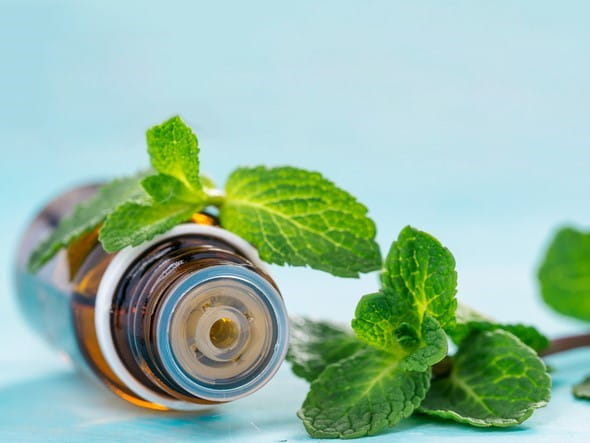Can Menthol Have Harmful Effects?

The Bottom Line
Natural products such as peppermint oil have many components. Menthol is the most abundant compound found in peppermint oil. Menthol can cause superficial irritation in small amounts and severe systemic symptoms in large amounts.

The Full Story
Essential oils are derived from plants. Their purpose is not exactly known, but some experts think that it could be a protective mechanism for the plant; others propose that they might attract pollinators. Peppermint is a popular essential oil used alone and in combination with other essential oils. Menthol is the main component of peppermint oil and is responsible for the noticeable cooling sensation. Menthol is extracted from plants or synthesized and can be found in throat lozenges, intranasal inhalers, lotions, pain creams, foods, and many other products.
Some people think that the cooling sensation from menthol is caused by mechanical damage by menthol crystals or by evaporation (like when you touch rubbing alcohol), but this is not the case. The cooling is an interaction on the molecular level with the calcium and channels in our bodies. Receptors that are responsible for feeling cold are triggered by menthol's effects on calcium and sodium channels and a cooling sensation occurs. There are calcium and sodium channels in cell membranes throughout our bodies, and that is why we can see systemic toxicity after swallowing or inhaling concentrated amounts of menthol. Serious effects include seizures, coma, and death.
Menthol can cause eye and skin irritation. When used on the skin, menthol is typically diluted into a "carrier oil", lotion, or other vehicle. If a high-percentage menthol product is applied to the skin, irritation and even chemical burns have been reported. There are a few reports of people being very sensitive to menthol and having severe skin reactions to even small amounts.
Products that contain menthol are flammable. In 2000, the FDA added a warning against putting products with menthol near a flame, in hot water, or in a microwave oven. There is additional warning about applying a menthol product to the skin and placing a heating pad over it.The heat increases absorption through the skin. In one case, putting a heating pad on a menthol rub resulted in tissue death.
Some nasal inhalers contain menthol. The menthol makes us feel as though we are breathing easier, but it does not actually help with congestion. In fact, it appears that more inflammation develops.
Lastly, some researchers think that cigarettes with menthol might increase the risk of becoming addicted to smoking and might be more toxic than regular cigarettes. Nicotine replacement products used to stop smoking work for menthol cigarette smokers as well.
If you think someone might be having adverse effects or have taken too much menthol, immediately call Poison Control at 1-800-222-1222 or check the webPOISONCONTROL® online tool for help. Whether you call or log on, expert assistance is available 24 hours a day.
Pela Soto, PharmD, BSHS, BS
Certified Specialist in Poison Information
Poisoned?
Call 1-800-222-1222 or
Prevention Tips
- Natural products should be regarded to be potentially as dangerous as drugs.
- Menthol gives the sensation of reducing congestion, but it actually can worsen congestion.
- Menthol flavoring in cigarettes might be associated with a higher rate of addiction to smoking. Smoking of all types of cigarettes, including mentholated cigarettes, is unhealthy.
- Keep all menthol-containing products out of the reach and sight of children.
This Really Happened
Case 1. A mother called Poison Control because an older child poured peppermint oil on her 3-month-old baby's head. She thought that it likely got into the baby's eyes and maybe into the mouth as well. The baby was not opening his eyes, the skin looked irritated and red, and the baby was crying. Poison Control recommended washing the baby's skin with soap and water, gently irrigating the eyes with water, and giving the baby something to drink, either by nursing or by giving formula.
About an hour later, mom brought the baby to an ER because she was worried. The ER physician called Poison Control to review the toxicity of peppermint oil and menthol. The physician reported that although the infant looked well, there was concern that some of the product might have been aspirated (leaked into the lungs). Poison Control said that when aspiration is suspected, a chest x-ray should be done about 6 hours after the substance was swallowed. The x-ray was done, and it was normal. The skin irritation went away with no additional treatment beyond washing with soap and water.
Case 2. A 26-year-old woman suffered for 2 years from mild, scaly, red patches that would appear periodically on her upper lip, around her mouth, and on the top of two of her fingers. She already knew that she had some chemical sensitivities because she was unable to handle any type of adhesive tape (she would get a red itchy rash).
She was referred to a contact dermatitis specialist who did some skin patch testing and found that she was sensitive to some commonly found substances. She was given a long list of things to avoid. Her symptoms got better, but she would still have the breakouts. The doctors did a study with 100 patients, and she was the only one who reacted to two products that had one thing in common – they both contained menthol. She admitted that she regularly smoked menthol cigarettes, but did not stick with a particular brand. She did not use any other products that contained menthol. She figured out which brand was causing the problem and stopped smoking that type of cigarette. She remained symptom free after that. (from Camarasa and Alomar, 1978)For More Information
Poison Post June 2014. Essential oils: poisonous when misused. Poison Post; Jun 2014.References
Camarasa G, Alomar A. Menthol dermatitis from cigarettes. Contact Dermatitis 1978:4:169-170.
Eccles R. Menthol and related cooling compounds. J Pharm Pharmacol 1994;46:618-30.
Noiles K, Pratt M. Contact dermatitis to Vicks VapoRub. Dermatitis 2010;21:167-9.
Wilkinson SM, Beck MH. Allergic contact dermatitis from menthol in peppermint. Contact Dermatitis 1994;30:42-3.Poisoned?
Call 1-800-222-1222 or
Prevention Tips
- Natural products should be regarded to be potentially as dangerous as drugs.
- Menthol gives the sensation of reducing congestion, but it actually can worsen congestion.
- Menthol flavoring in cigarettes might be associated with a higher rate of addiction to smoking. Smoking of all types of cigarettes, including mentholated cigarettes, is unhealthy.
- Keep all menthol-containing products out of the reach and sight of children.
This Really Happened
Case 1. A mother called Poison Control because an older child poured peppermint oil on her 3-month-old baby's head. She thought that it likely got into the baby's eyes and maybe into the mouth as well. The baby was not opening his eyes, the skin looked irritated and red, and the baby was crying. Poison Control recommended washing the baby's skin with soap and water, gently irrigating the eyes with water, and giving the baby something to drink, either by nursing or by giving formula.
About an hour later, mom brought the baby to an ER because she was worried. The ER physician called Poison Control to review the toxicity of peppermint oil and menthol. The physician reported that although the infant looked well, there was concern that some of the product might have been aspirated (leaked into the lungs). Poison Control said that when aspiration is suspected, a chest x-ray should be done about 6 hours after the substance was swallowed. The x-ray was done, and it was normal. The skin irritation went away with no additional treatment beyond washing with soap and water.
Case 2. A 26-year-old woman suffered for 2 years from mild, scaly, red patches that would appear periodically on her upper lip, around her mouth, and on the top of two of her fingers. She already knew that she had some chemical sensitivities because she was unable to handle any type of adhesive tape (she would get a red itchy rash).
She was referred to a contact dermatitis specialist who did some skin patch testing and found that she was sensitive to some commonly found substances. She was given a long list of things to avoid. Her symptoms got better, but she would still have the breakouts. The doctors did a study with 100 patients, and she was the only one who reacted to two products that had one thing in common – they both contained menthol. She admitted that she regularly smoked menthol cigarettes, but did not stick with a particular brand. She did not use any other products that contained menthol. She figured out which brand was causing the problem and stopped smoking that type of cigarette. She remained symptom free after that. (from Camarasa and Alomar, 1978)